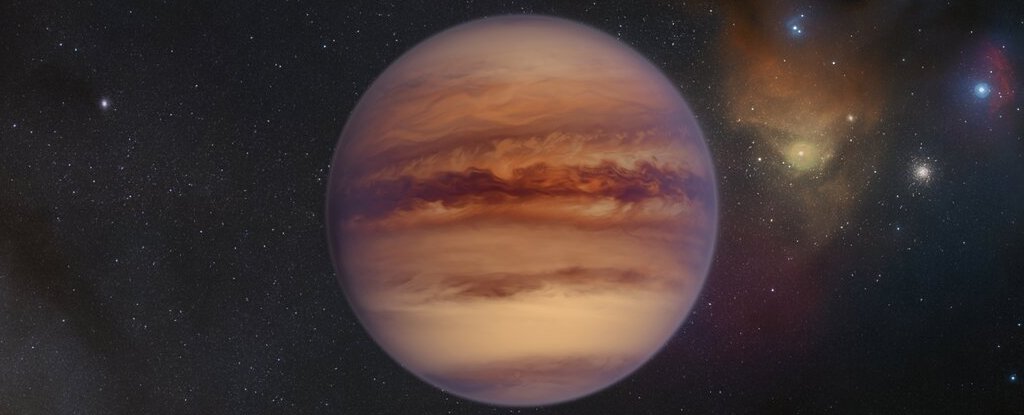
Posted on 12/23/2021 6:05:31 AM PST by Red Badger

Interstellar space is a graveyard of lost souls. Adrift far from any star, these planets float in the darkness like ghost ships in the night.
Catching sight of one requires patience, and a good eye. But a new approach based on tens of thousands of images collected by the European Southern Observatory's facilities has resulted in the identification of as many as 170 potential 'rogue' worlds in our corner of the galaxy.
If a good fraction of them are confirmed to be planets, it would suggest the Milky Way is swarming with solar exiles.
"There could be several billions of these free-floating giant planets roaming freely in the Milky Way without a host star," says Hervé Bouy, an astronomer at the Laboratoire d'Astrophysique de Bordeaux in France.
Rogue planets all start their existence in the same swirls of gas and dust that give rise to a typical solar system, but some of these clouds of matter may be too small to form the star part of the system.
How many are virgin births, created without a star in sight, and how many are kicked out of their nest is hard to say. We just don't have enough information.
Being planets, they don't glow with the ferocity of a star. Detached from a solar system, they don't follow an orbital path that might otherwise identify them as an exoplanet.
Most suspects have been glimpsed indirectly as dimples in space-time as their massive bodies briefly distort the background of starlight, a method that usually doesn't lend itself to a second look.
What we really need is a sizable sample of rogues we can return to time and again to track and analyze.
Astronomers behind this latest data trawl took advantage of the fact newborn planets continue to glow with residual heat for many millions of years.
By scanning for this weak radiation signature amid images taken using ESO's high powered telescopes, they were able to amass a huge list of candidate 'free-floating planets' within the Upper Scorpius and Ophiuchus constellations.
"We measured the tiny motions, the colors and luminosities of tens of millions of sources in a large area of the sky," says Laboratoire d'Astrophysique de Bordeaux astronomer and first author, Núria Miret-Roig.
"These measurements allowed us to securely identify the faintest objects in this region, the rogue planets."
It's unlikely all will turn out to be planets. Of the 170 signatures, as few as 70 might actually qualify.
Where gravitational lensing effects or the tell-tale wobble of a star being tugged by a heavy companion can give clear clues on the size of a planet, it's harder to estimate mass from the light alone.
A brighter rogue could be a bigger one. Or it could be a sign that it's freshly baked.
Associating each candidate with the approximate age of the star-generating region of space it's found in helps set limits on its likely mass, but some could still turn out to be big enough to technically qualify as a dimly burning, low mass star.
While there's plenty of work to be done chasing up these potential dark nomads, the success of the technique puts us on a path for gathering the numbers needed to better understand their origins.
Already the density of the rogues alone suggests the isolated 'core collapse' model can't be the only way to produce them, lending credibility to a significant portion of the planets being outcasts.
Excitingly, we're on the verge of a whole new generation of space-watching technology which should help us expand our knowledge on such elusive objects even further, potentially allowing us to study their fates as well as their past.
"These objects are extremely faint and little can be done to study them with current facilities," says Bouy.
"The ELT [Extremely Large Telescope] will be absolutely crucial to gathering more information about most of the rogue planets we have found."
This research was published in Nature Astronomy.
This calls for a Galactic education program to provide guidance for these wayward objects. Surely some democrat can figure out a way to appropriate trillions for this.
No they’re fleeing the core explosion.😜
Could be another star ripped the planet from it’s orbit from it’s star and the civilization on that planet froze. I have read science fiction stories like this like “When Worlds Collide” and “After World’s Collide”.
BFL
Thanks Red Badger.
· join · view topics · view or post blog · bookmark · post new topic · subscribe · Google news searches: exoplanet · exosolar · extrasolar ·
the rest of the rogue planets keyword:
A great plat for a Sci-Fi movie!
Of all the things I never would have guessed, planets running hurdles is right up there at the top.
But, I guess it’s better than planets doing long jump. That would be... impactful.
“When Worlds Collide” was one such. The two books sucked, really hard, and yet somehow the movie was worse.
I really liked the books “When Worlds Collide” and “After Worlds Collide” ... I just had to keep my mind on the fact that it was science fiction written well befor World War II ...
:^)
Disclaimer: Opinions posted on Free Republic are those of the individual posters and do not necessarily represent the opinion of Free Republic or its management. All materials posted herein are protected by copyright law and the exemption for fair use of copyrighted works.